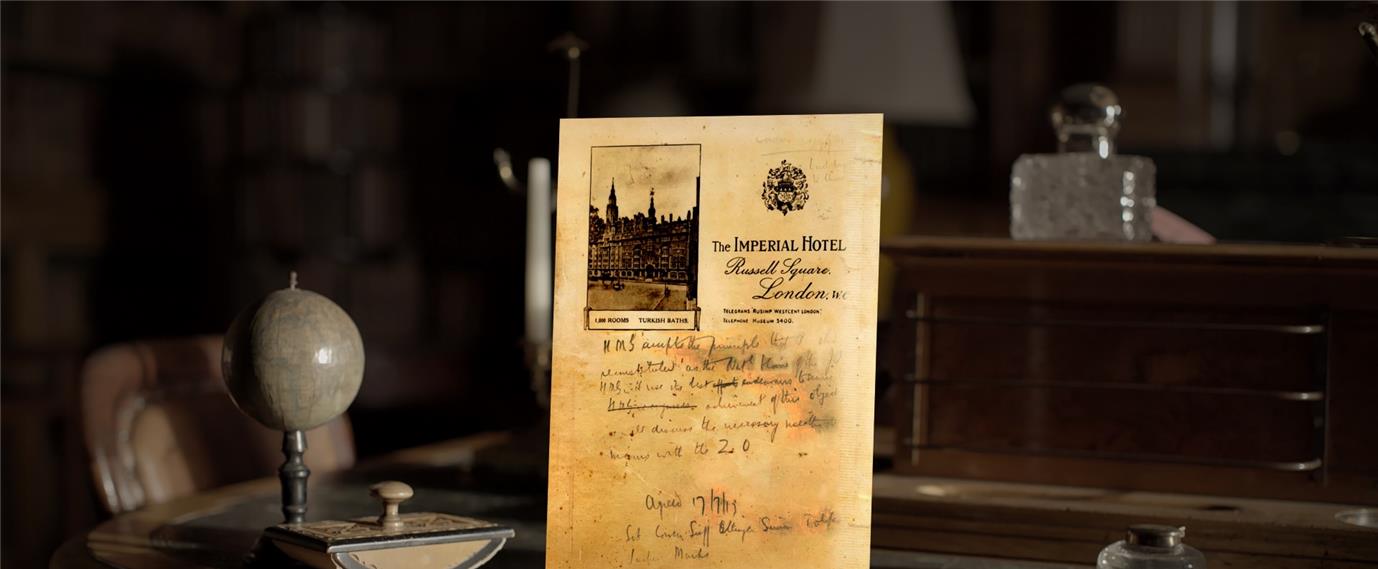يواجه الفيلم الوثائقي الذي يتناول موضوعاً تاريخيا تحديا في شكل المعالجة الفنية؛ إذ يقفُ فريق الإنتاج عادة أمام معطيات تتمثل في وفرة المادة البحثية، والآليات الممكنة لتوظيف الأرشيف، وتعويض النقص القائم فيه بصريًّا، علاوة على سؤال بالغ الأهمية، يتجسدُ في كيفية تحويل المادة البحثية والأرشيف، وأي نقصٍ بصريٍّ في الجانب التاريخي إلى فيلم متجانسٍ، يقدمُ روايةً وسرداً ممتعاً ضمن الفضاء السينمائي؟
الخروج من القوالب الجامدة
ولكي لا تُقيد المادة التاريخية المخرج، عبر حصره في مقابلة الشخصيات، وعرض الأرشيف، تلجأ بعض شركات الإنتاج إلى حلول إبداعية وغير تقليدية، وربما يعد فيلم "وعد بلفور" الذي بثته قناة الجزيرة الإخبارية نهاية أكتوبر الماضي، نموذجاً لكيفية خروج أي وثائقي من القوالب الجامدة المتعارف عليها، استناداً إلى بدائل بصرية وموضوعية.
محمد سلامة، مخرج الفيلم، يوضح لـ"مجلة الصحافة" بعض الحلول المتبعة في "وعد بلفور"، منها "تصوير المقابلات بكادرين، كادر رسمي معتم وواسع يحتوي عمقا يتناسب مع موضوع الفيلم، والكادر الثاني تمثل في لقطة جانبية قريبة ومتحركة بعناية لوجه الضيف، بحيث تظهر ضوءا قويا من خلف وجهه ومواجها للكاميرا، ما يعطي انطباعا أن الضيف يضيء على بعض الجوانب التاريخية التي لا نعلمها، هذه الغرابة في الكادر مع ما يعنيه، قد تضيف بعدا جماليا ومعنويا للفيلم، وتضفي نوعا من التغيير المستمر المطلوب على مدار الفيلم.
ولإضفاء مزيد من الحيوية على الفيلم ومنحه أبعادا أكثر عمقا، ذهب فريق العمل نحو "ربط وعد بلفور بالواقع المعاش حاليا، وذلك من خلال مونتاج صادم وسريع يدمج اللقطات الأرشيفية للنتائج الكارثية للوعد بقيام دولة إسرائيل وتجهير الشعب الفلسطيني، مع لقطات حية وحديثة لليهود والصهاينة في أكثر من مكان حول العالم".
جذب الجمهور إلى الحكاية
ريك بلات، مخرج المشاهد الدرامية في الفيلم، يرى أن "الممثلين هم الذين يعيدون الحياة إلى أحداث تاريخية جافة"، موضحا أن فريق العمل تمكن من "تحويل الأحداث والشخصيات المحيطة بالتوقيع على اتفاقيات بلفور إلى عمل درامي، وذلك لجذب الجمهور إلى الحكاية".
ويتابع بلات حديثه للمجلة "الدراما تضيف الكثير جداً إلى تعقيدات سرد الحكاية وتجعل أي رواية أكثر التصاقاً بالمشاهد"، مؤكداً أن رؤيته هذه تستند إلى كونه مخرج دراما وخلفيته هي التمثيل وكتابة المسرحيات، "لذلك ستراني دائماً داعماً للمثلين في الدراما مفضلاً إياهم على مقاطع الأرشيف، وأفضل الصوت على السرد وعلى المقابلات الشخصية".
وفي هذا الصدد؛ يعقب سلامة على حديث بلات قائلا: "العامل الأهم الذي عملنا عليه، هو محاكاة كاملة لأهم أحداث الفيلم عن طريق إعادة تجسيدها بالمشاهد التمثيلية المنفذة بعناية، بحيث تتضافر مع كلام المؤرخين الذين يصفون أدق تفاصيل الأحداث والاجتماعات وحتى الشخصيات وملابسهم وأسلوب حياتهم، هذا التكامل ما بين الرواية التاريخية التي ينطق بها المؤرخون والمشاهد التمثيلية كفيلة بجعل المشاهد يتورط في أحداث الفيلم وجذبه للجلوس أمام الشاشة حتى اللقطة الأخيرة".
لبنة بنائية في جسم الفيلم
ويتابع مخرج الفيلم موضحاً أن "المشاهد الدرامية في فيلم وعد بلفور هي لبنة بنائية في جسم الفيلم غير منفصلة عن سياقه ولا مقحمة فيه. أضف إلى ذلك أن إعادة تمثيل الأحداث بشخوصها يقرب الصورة الذهنية التي نريد إيصالها، لاسيما وأن أحداث الفيلم تدور في زمن لا تتوفر فيه صور حقيقية كافية لتخدم موضوع الفيلم.. ودعني هنا أضيف نقطة مهمة، هذه المشاهد الدرامية، صنعناها بناءا على حقائق واضحة ومثبتة بالوثائق التاريخية، وتم تنفيذها تصويرا ومونتاجا وتلوينا بطريقة لا تُخرج الفيلم الوثائقي من وثائقيته، ولا تجعله فيلما روائيا، رغم جودة ودقة تنفيذها. وبالمناسبة، فقد استعنا بفريق عمل يتكون من حوالي 50 شخصا متخصصين في هذا النوع من الدراما لتنفيذ هذه المشاهد".
يوضح المنتج محمد الصعيدي صعوبة الإنتاج الوثائقي في الموضوعات التاريخية إذ أن "لها مقدمات وحيثيات وإحداثيات كثيرة، ويصعب على الفيلم أن يحيط بها، وأن يقدمها للمشاهد بقدر ما أن صانع الفيلم يعرض أبرز هذه الحيثيات وأهمها للسياق، ما يجعل من روايته للأحداث مفهومة؛ فالتاريخ بشكل عام مادة صعبة وربما مملة، وللإبقاء على انجذاب المشاهد لها فأنت تحتاج أن تبني السياق بناء قصصيا تتتابع فيه الأحداث وتفضي لبعضها دون حرفها عن مسارها، خدمة للبناء القصصي".
ولتعويض النقص في الرواية التاريخية، فأنت بحاجةٍ إلى إيجاد "المعادل البصري الجذاب الذي يقرب المشاهد لتلك الفترة"، بحسب الصعيدي، الذي يؤكد أن فريق العمل سعى "للحصول على أفضل أرشيف لتلك الحقبة، بل ولتلك الأحداث، وأيضا الحاجة التي تظهر في بعض الأحيان لاستخدام المعادل الدراميReconstruction وهو أمر جاذب للمشاهد، ويوضح له سير الأحداث، كما يمنح كاتب الفيلم بعض الحيثيات المهمة في القصة والتي لربما لا يوجد أرشيف أو معادل بصري كلاسيكي لتغطيتها".
وعن تعويض المعادل البصري عبر الدراما، يرى أن "الإنتاج الدرامي التاريخي مكلف في تجربتنا علاوة على الحاجة إلى التدقيق، للتأكد من مطابقة المشهد للحقبة التاريخية التي نبحثها في الفيلم. ومهم هنا أيضا الحاجة لكتابة مشاهد الدراما بناء على الوثائق التي نجمعها من مكتبات الوثائق البريطانية والفرنسية والإسرائيلية كما في حالة فيلم "وعد بلفور"، وبالتالي علينا الالتزام بأقصى حدٍّ لعكس ما جرى دراميا، من اجتماعات ولقاءات بناء على ما جاء في محاضرها".
بين سايكس بيكو ووعد بلفور
يذكر أن فكرة إنتاج الفيلم بدأت في العام 2015، عندما كانت شركة نون فيلمز ومقرها لندن، تصوّر فيلما آخر يتناول ذكرى مرور مائة عام على اتفاقية سايكس بيكو، حمل عنوان "خطوط على الرمال"، وللحدثين (سايكس بيكو ووعد بلفور) علاقة قوية ببعضهما حسب مجموعة كبيرة من المؤرخين؛ إذ عوض البريطانيون صغر حصتهم الجغرافية في اتفاقية سايكس بيكو عام 1916 مع الفرنسيين، بالبحث عن أراضٍ عربية جديدة تدعم نفوذهم، فكان دعم الحركة الصهيونية، طريقاً لتثبيت موطئ قدم لهم في فلسطين.
وقد عمل فريق العمل على إعادة بناء بعض الأحداث لقصة صدور "وعد بلفور" في مشاهد درامية، انطلاقاً من وثائق الأرشيف، ومذكرات شخصيات شاركت في تلك الاجتماعات، ليشكل بذلك معادلا بصريا يحاكي تلك الفترة التاريخية، وما شهدتهُ من تحركات سياسية قادت فيما بعد إلى احتلال فلسطين وإعلان قيام "دولة إسرائيل".
وشملت رحلة تصوير الفيلم ست دول، هي بريطانيا والولايات المتحدة وفرنسا وإيطاليا والأردن وفلسطين.








































